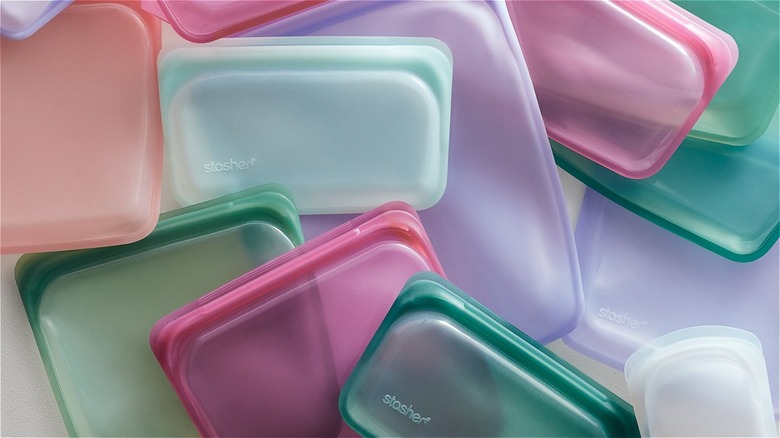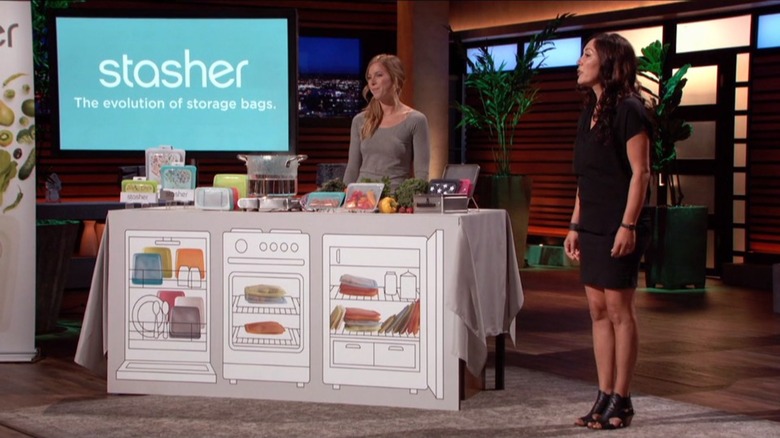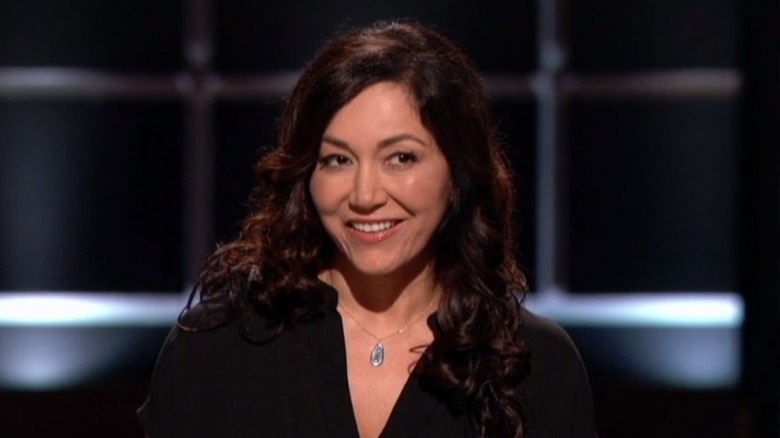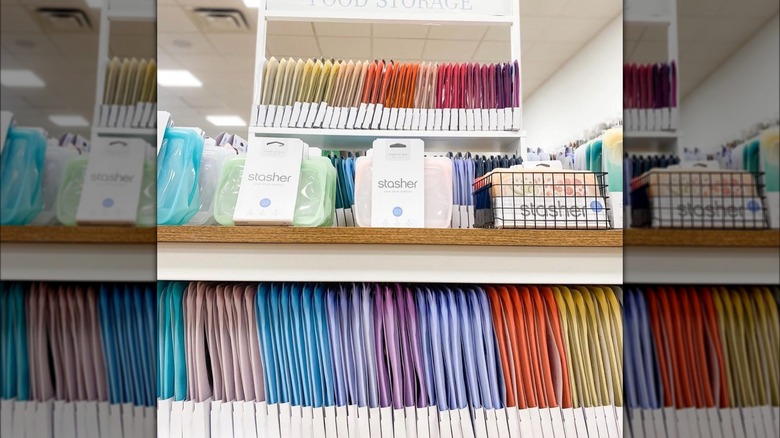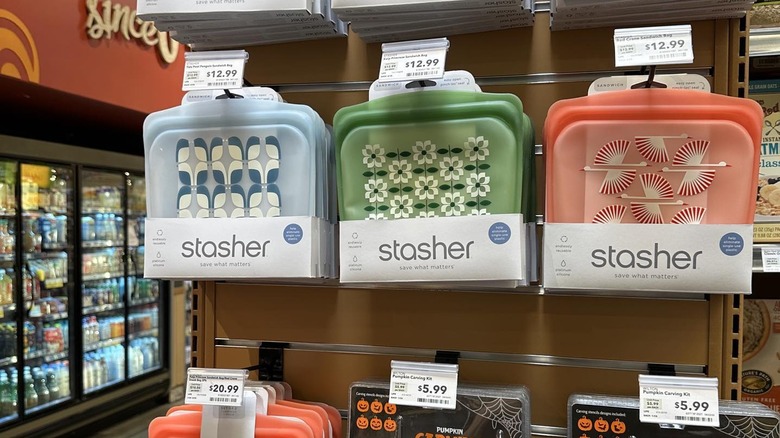What Happened To Stasher After Shark Tank?
In 2005, Kat Nouri created modern-twist, a company that created hand-silk screened products such as table runners, coasters, kids' bibs, serving ware, and even trivets made of 100% pure food-grade silicone. It was modern-twist and Nouri's life as a mom that got her thinking about other uses for silicone. "It didn't make sense to me that we put all this thought and spent all this money on consuming wholesome food, but then to turn around and store, cook, and freeze in petroleum-based bags or containers that are filled with thousands of toxic chemicals — including BPA and other phthalates," she told Perfect Snacks. And so, Stasher was born.
Nouri's "Shark Tank" pitch was most memorable because she continually argued with the Sharks about the obvious positives of using her product and kept turning their questions back to them. She was also laser-focused on getting Mark Cuban on board. Despite the presence of four other Sharks, she practically ignored all of them, making her pleas directly to Cuban and even offering him a larger stake in her company than the amount she was originally asking for.
What Happened To Stasher on Shark Tank?
Kat Nouri appeared on "Shark Tank" in 2018, asking for $400,000 in return for a 5% stake in Stasher. Nouri told the Sharks that Stasher is the first silicone Pinch-Loc bag in the world and would last for thousands of uses. She also explained the bags are safe to use in the freezer, dishwasher, microwave, stove top, oven, and sous vide, exulting their advantages over plastic. Nouri also explained altruism was her motivation in founding the company. She didn't start Stasher solely to make money but to help make the world a better place by providing a long-lasting, viable plastic alternative.
After making $1.6 million in the year since Stasher entered the market, Nouri told the Sharks she was convinced Stasher would be a $100 million company within four years. Although the Sharks were impressed with her confidence, Robert Herjavec dropped out because the product didn't excite him. Barbara Corcoran followed, looking at it as just another expensive bag. Lori Greiner attempted to ask Nouri more questions. However, Nouri kept interrupting and talking to Cuban, telling him not to bow out. Even when Greiner and Rohan Oza told her they were out, she didn't seem to care because she was focused on Cuban.
Nouri and Cuban went back and forth on stakes and investments. Cuban eventually asked for 20% in exchange for $400,000 and a $400,000 line of credit. After talking him down to 15%, she agreed, ecstatic that Cuban was going to work with her.
Stasher After Shark Tank
Stasher felt the "Shark Tank" effect after Kat Nouri's appearance on the show, and the number of Stasher employees grew from five to 38 to keep up with demand and changes. Even though Nouri fought so hard to make a deal with Mark Cuban, she never got the help with E-commerce or the line of credit she so desperately wanted because their deal never closed. "In the end, we spent $20,000 to $25,000 on the negotiations, and I really wanted to make it happen. But I wanted a deal that still let me run the company the way I wanted to, and I couldn't get that deal, and I had to walk away," she explained on the How I Built This with Guy Raz podcast.
Thanks to the show, she received a $500,000 investment from a friend's brother, which made it easier to reject Cuban's offer. She also was able to get Stasher into Target after appearing on "Shark Tank," followed by larger stores. Then, in December 2019, three years after starting the company, Kouri sold it to SC Johnson, the maker of Ziploc plastic bags. Her reasoning, she said, was that she "wanted Stasher to be in the hands of everyone if it was going to make real change." She believed that SC Johnson had the distribution capabilities to get Stasher in stores in a way that she couldn't.
Is Stasher still in business?
Stasher has expanded its product line with 14 different sizes for bags and bowls and three different sizes for beauty and toiletries. The bags range in size from the pocket, which is 4 ounces and $7.99, to the stand-up mega bag, which holds 104 ounces and is $34.99. The bowls range from a one-cup size for $12.99 to an eight-cup version for $36.99. Stasher also offers bundles, such as the starter kit seven-pack, giving customers variety for less money.
While you can still get the bags in solid hues, there are also unique options like tie-dyed, striped, and others featuring stenciled pictures of cranes, penguins, flowers, polka dots, and more. Despite being a 7-year-old company, Stasher is still getting new rave reviews for its environmentally friendly and cost-saving design, with CNN's Underscored describing Stasher as "an amazingly versatile tool you need in your kitchen." The company also earned Good Housekeeping's Kitchen Gear Award.
While Stasher's website proclaims that its product lasts 3,000 uses, accidents can happen. For those bags and bowls that don't stand the test of time, the brand has a partnership with the recycling program Terracycle. All you need to do is fill out the form online, get a free shipping label, and drop it off with the UPS, and Terracycle will recycle it and give your damaged bag new life elsewhere.
What's next for Stasher?
Stasher seems to have found its niche, focusing on the environmental and health benefits of using the bags — which happens to be exactly what the Sharks told Kat Nouri she should've been emphasizing in the first place. Between Target, Whole Foods, Amazon, and the brand's website, there are always good tips on new ways to use the bags (such as the microwave popcorn hack that customers rave about). There are also seasonal stencils that customers can download if they want to decorate their bags, and the company recently released bags with prints for the holidays.
After selling Stasher to SC Johnson, Nouri left the company. Instead of becoming CEO, she decided to stay as a brand ambassador and consultant. She felt that she needed to finally be present for her kids because she'd been working on one of her other businesses or trying to get Stasher off the ground for most of their lives.
"Now that they're young adults, I really want to, not just be here for my kids, but I want to be here for other women, and I want to do things that will have a bigger footprint in the money I was able to make with my passion for something that will hopefully change the plastic food print of our society, and hopefully do something else that's possibly even bigger," she told Guy Raz.
